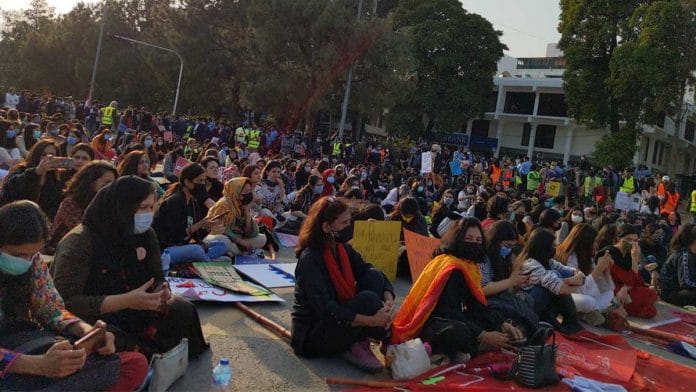In recent years, the beautiful region of Kashmir has scaled new heights in tourism, drawing in a historic number of visitors. As cricketing legend Sachin Tendulkar shows off the valley on social media, one can see why Kashmir is called heaven on earth. However, juxtaposed against this success story is the neighbouring nation of Pakistan, embroiled in turmoil and strife, garnering attention for all the wrong reasons. While Kashmir thrives as a haven for tourists, Pakistan struggles under the weight of its own internal challenges, earning the unfortunate moniker of “hell on earth”.
Kashmir has witnessed many positive changes in recent years, from the opening of its first cinema hall after 30 years to the booming tourism industry; and the heart-warming sight of Tendulkar interacting with ordinary Kashmiris offers a glimmer of hope. However, what gripped my attention was a chilling account from Pakistan, where a mob relentlessly pursued a woman, clamouring for her beheading simply because she wore a dress adorned with Arabic calligraphy. The mob’s accusation of blasphemy, fuelled by their misguided belief that the dress bore Quranic verses, is nothing short of horrifying. The sheer absurdity of condemning someone to death over blasphemy is staggering, but the situation took a surreal turn when it was revealed that the mob couldn’t even decipher the word printed on the garment. “Halwa” meaning sweet in Arabic, was the innocent inscription on the dress—a fact lost amid the frenzy of ignorance and intolerance. This sharp contrast serves as a reminder of the profound impact that political stability, or lack thereof, can have on a region’s prosperity and reputation.
As the world reacts with shock to the distressing events unfolding in Pakistan, even Muslim-majority nations are left reeling. Yet, it’s clear to me that this isn’t just an isolated incident—it’s a symptom of much deeper societal issues. The reluctance to face their own history, coupled with an eager adoption of Arab and Turkish cultural identities, is part of the underlying problem corroding Pakistani society. The mob, behaving like mindless drones, is just one aspect of this. The fact that Pakistan’s legal system includes death penalties for blasphemy speaks volumes—the country values strict adherence to extreme interpretation over individual freedoms. It’s a place devoid of hope and mired in despair. There are many reasons for this bleak perception.
Also read: UAE’s new Hindu temple a lesson for Indian Muslims—Respecting other faiths doesn’t weaken yours
Living in fear
The plight of women in Pakistan is a harrowing tale of suffering and injustice. From the relentless grip of forced marriages to the insidious shadow of workplace harassment, and the chilling spectre of domestic violence, their daily existence is a battleground for survival. Noor Muqaddam’s brutal rape and murder by the son of one of Pakistan’s wealthiest industrialist families is a testament to the depths of depravity humanity can sink to. And then there is the story of Ayesha Akram, a TikTok creator, who was assaulted by a group of around 400 men when she was filming a video of her holding the Indian and Pakistani flags. This discrimination exists in Pakistan’s legal system as well. Not too long ago, laws such as the Hudood Ordinance, that perpetuated gender inequality, were in effect. These laws have led to egregious injustices, with victims of sexual assault unjustly charged with adultery or fornication. This is the epitome of hell on earth for women.
Pakistan also has earned a reputation as the epicentre of global terror, especially after the discovery of Osama Bin Laden close to the Pakistan Military Academy in Abbottabad, Khyber Pakhtunkhwa, Pakistan. More recently, on 16 January, Iran launched missile strikes into Pakistan’s Balochistan province, claiming to have targeted two strongholds of the anti-Iran insurgent group Jaish al-Adl (Army of Justice).
Pakistan has been accused of supporting terrorist activities against India for decades, using various militant groups to perpetuate insurgency in the region of Jammu and Kashmir. This support includes providing financial backing and arms to these militant organisations. Afghanistan has also suffered due to the conflicting security interests with Pakistan, further exacerbating tensions and instability in the region.
Living in a state where minorities constantly fear for their safety due to their identity is nothing short of hell on earth, which is the situation in Pakistan. Despite comprising only 4 per cent of the population, Christians and other religious minorities bear the brunt of discriminatory practices, with half of all blasphemy charges being levied against them. And around 1,000 girls from minority communities are forcibly abducted and converted to Islam annually, according to a 2021 report by the All Party Parliamentary Group (APPG) for Pakistani Minorities. The Shia community also faces relentless sectarian violence, with thousands of lives lost in extremist attacks, painting a grim reality for religious minorities in Pakistan. This underscores the dire conditions faced by Pakistan’s minority communities. Despite constitutional guarantees of equal protection and rights, minorities continue to endure persecution, violence, and discrimination.
All this is merely the tip of the iceberg of the pervasive rot within Pakistan’s system. The depth of suffering is staggering, and there seems to be little hope for change unless there is a fundamental shift in attitude. The stark reality is that while India is ambitiously planning missions to carry humanity into space, in Pakistan, mobs are ruthlessly attempting to behead women over accusations of blasphemy.
Amana Begam Ansari is a columnist and TV news panelist. She runs a weekly YouTube show called ‘India This Week by Amana and Khalid’. She tweets @Amana_Ansari. Views are personal.
(Edited by Theres Sudeep)






